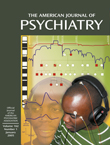Memory Impairments Identified in People at Ultra-High Risk for Psychosis Who Later Develop First-Episode Psychosis
Abstract
OBJECTIVE: While cognitive deficits are frequently reported in psychotic disorders, it is unclear whether these impairments predate the onset of illness and to what extent they are predictive of later transition to psychosis. METHOD: The authors studied 37 healthy volunteers and 98 symptomatic, help-seeking patients meeting the inclusion criteria of a treatment program for people at ultra-high risk for psychosis. Of the ultra-high-risk patients, 34 (34.7%) developed psychosis over the course of the investigation. Premorbid and current IQ, attention, memory, and executive functioning were measured with instruments including subtests from the Wechsler Memory Scale—Revised (WMS-R). Analyses compared the ultra-high-risk patients who became psychotic, those who did not become psychotic, and the comparison subjects. RESULTS: Overall, the ultra-high-risk subjects had significantly lower performance IQs than the comparison subjects. Further, impairments were also found in the visual reproduction subtest and the verbal memory index (predominantly owing to lower logical memory scores) of the WMS-R that were specific to the ultra-high-risk-patients who developed psychosis. No other memory, attentional, or executive tasks discriminated between any of the groups. CONCLUSIONS: These findings suggest that visuospatial processing impairment and some memory deficits were apparent before the full expression of psychotic illness. Cognitive performance on more complex tasks requiring rapid registration and efficient recall may be compromised before development of first-episode psychosis. Further experimental tasks that challenge these cognitive domains are required to clarify the predictive value of these results.



